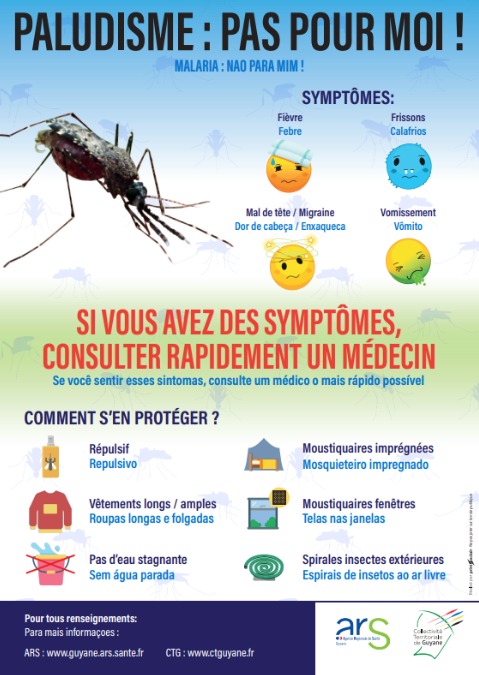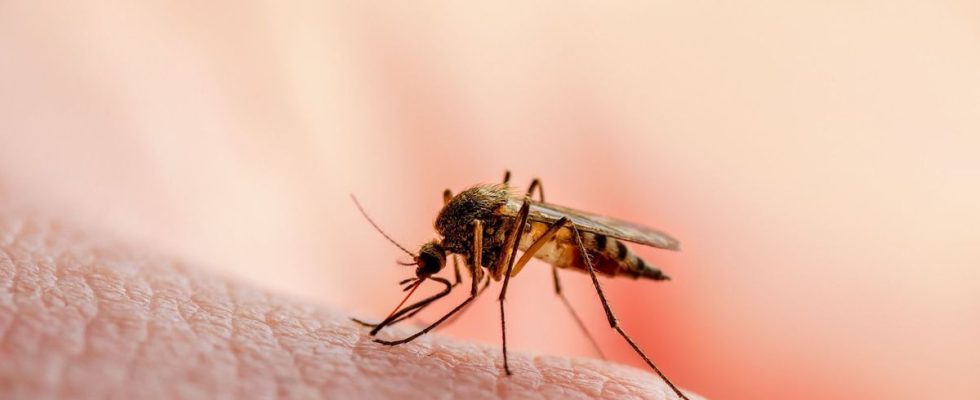Published on
Updated
Reading 3 min.
The regional health agency of Guyana is reporting a worrying epidemiological situation with an outbreak of malaria in the region since the last quarter of 2023. A situation not seen since 2018.
Malaria: an alarming epidemiological situation
The epidemiological bulletin from ARS Guyana notes an unprecedented situation since 2018: “Overall activity linked to malaria increased very sharply during the last quarter of 2023 and this trend continued in January 2024 (…) The levels reached had not been observed since 2018, the last year during which a seasonal upsurge had been recorded mainly on St Georges de l’Oyapock“.
The figures are indeed worrying:During the last quarter of 2023, 248 bouts of malaria were diagnosed in a healthcare structure in the area, including 137 (or 55%) in December. In January 2024, 130 malaria attacks were recorded. In comparison, a total of 51 accesses were recorded in 2022 (over the full year)“.
There were 378 malaria outbreaks recorded in Guyana between October 2023 and January 2024. The contaminations mainly took place in gold panning areas but also in sectors hitherto spared such as rural areas/tracks in the communes of Kourou , Montsinéry and Roura, the village of Cacao and surrounding areas, as well as St Georges.
Malaria: from symptoms to treatment
Malaria is transmitted to humans by the bite of a female Anopheles mosquito, itself infected after biting a malarial man. The mosquito that transmits malaria is active at night. It is therefore during the period from sunset to sunrise that the risk of being bitten is highest.
The main symptoms are as follows: fever, headache, chills, etc. These symptoms can be accompanied by stomach aches, nausea, diarrhea. Typical cycles alternating fever, tremors with intense sweating can then occur: this is “malarial attack”.
If you have the symptoms described above:
- See a doctor as soon as possible.
- Do not take medication without medical advice (apart from paracetamol to combat fever and pain).
- Rest under a mosquito net to limit contamination from mosquitoes which could bite you, and which could then contaminate your loved ones.
When you are ill: early diagnosis and rapid treatment are very important to control the illness, it shortens its duration and limits possible complications. It is essential to take the medicines until the end of treatment. Pregnant women and children are particularly vulnerable to malaria.

Incubation times vary and can be long, which is why for any consultation with a doctor in case of fever, and within 12 months following your return from a risk area, it is important to inform that you have traveled to a malaria circulation area.
Essential prevention
No vaccine is currently available to protect against malaria. Prevention is thus based on two actions:
Protect yourself from mosquitoes:
- Sleep under an impregnated mosquito net (or in closed, air-conditioned rooms);
- Wear loose, covering clothing;
- Use skin repellents at nightfall and early morning (following the producers’ instructions);
- Equip your homes with mosquito nets on doors and windows.
If you travel to a risk transmission area, consult your doctor and take preventive treatment (chemoprophylaxis, examples: atovaquone-proquanil, mefloquine, doxycycline). This treatment is covered by Social Security for socially insured people in Guyana.
In 2015, the ARS adopted a regional plan to combat malaria, drawn up through collaboration with numerous institutional, scientific and field partners. She manages this plan and ensures its implementation. The objective of these actions is to be able to control the transmission of this disease throughout the region in order to ultimately eliminate it from the territory.
